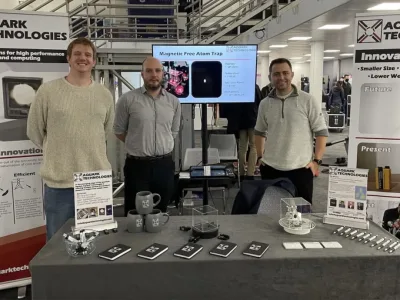
$5m for flexible hybrid R&D
Five R&D projects in the US are sharing $5m to develop flexible hybrid electronics (FHE) for sensors, medical devices, automotive electronics and other consumer and industrial microelectronics products.
“The new projects push the limits of technology in ways that are not funded by private sector alone, illustrating the vital importance of the SEMI FlexTech program in evolving FHE technology development across multiple high-growth industries,” said Gity Samadi, Director of R&D Programs for SEMI FlexTech. “Flexible hybrid electronics help transform traditional rigid products into devices that are conforming, highly reliable, and often more sustainable.”
ACI Materials will optimize the performance of its Alchemy high-film-thickness conductive sintering and semi-sintering pastes, inks, and coating for additive manufacture of higher performance FHE and direct writing in 3D printed circuit structures. Advanced inks are a key enabler to the continued growth of 3D printed components, a rapidly growing manufacturing capability. ACI is teaming with nScrypt for this 18-month project costing $510,000.
The University of Washington will demonstrate a systematic approach to in situ monitoring and machine learning control of electrohydrodynamic inkjet printing, enabling adaptable and scalable micron-scale manufacturing of 2D optics, interconnects and flexible devices. The UW will team with Iowa State University, SIJTechnology, Cyber Manufacturing and Metrology Solutions and Kent Displays on this $848,847 project.
Cornell University will apply artificial intelligence (AI) to increasing the reliability of printed electronics using optical and ultrasonic metrologies and acoustic emissions. Cornell will team with BotFactory and Geegah LLC on this $575,000 project.
GE Research will develop and demonstrate a bio-inspired soft robot for assisting a human operator in performing inspection maintenance and repair (IMR) in highly confined spaces inside industrial and defense facilities. GE Research will collaborate with Binghamton University, Georgia Tech and UES on this 18-month project costing $2 million.
GE Research will develop a high-power (≥1.2kV), low-profile, low-inductance silicon carbide power module using conformable direct write interconnects and packaging. Costing $1.8 million, the 18-month project promises to make high-power, high-voltage and high-current electronics more customizable and reduce the cost of producing them in low volume.
The FlexTech R&D program is supported by the U.S. Army Research Laboratory (ARL), based in Adelphi, Maryland.
More information on the SEMI-FlexTech funding programme
Related articles
- CEO Interview: Zinc flexible battery boost for 5G, IoT
- PragmatIC develops plastic 6502 processor
- ARM shows first plastic M0+ microcontroller
- Special plastic protects automotive radar sensors
Other articles on eeNews Europe
- TSMC to build 3nm fab for Intel chips
- ARM ships ground-breaking Morello secure processor board
- Start-up harvests electricity from human cells
- ASML fire hits EUV lithography production
- Has the semiconductor market fundamentally changed?
- Siemens teams for real time Covid-19 test
- Europe looks to secure silicon wafer supply
 If you enjoyed this article, you will like the following ones: don't miss them by subscribing to :
eeNews on Google News
If you enjoyed this article, you will like the following ones: don't miss them by subscribing to :
eeNews on Google News


